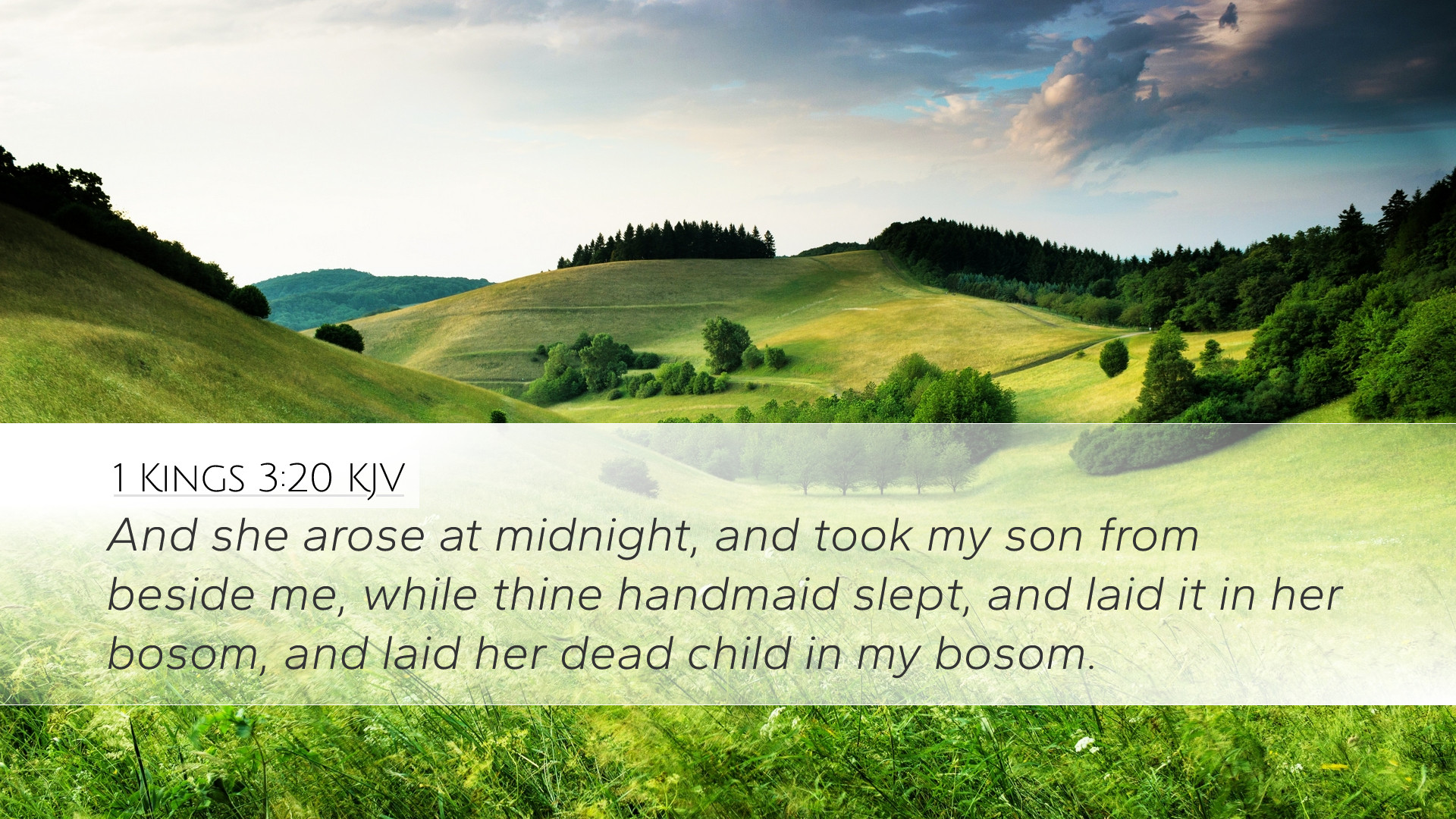Commentary on 1 Kings 3:20
1 Kings 3:20 narrates a profound and intricate incident in King Solomon’s early reign, where he demonstrates divine wisdom in resolving a contentious situation. The verse states:
"And she arose at midnight, and took my son from beside me, and laid him in her bosom, and laid her dead child in my bosom."
Context of the Passage
This verse falls within the larger narrative of Solomon's adjudication between two women, each claiming to be the mother of a baby. This episode illustrates not only the wisdom given to Solomon by God (1 Kings 3:5-14) but also the complexities of human relationships and the darkness that can seep into them.
Analysis of the Verse
In this verse, we witness the tension of a heart-wrenching situation. It reflects the raw emotions and desperation of the women involved. Let us explore the rich insights from various public domain commentaries:
Matthew Henry’s Commentary
Matthew Henry emphasizes the sheer gravity of the situation by analyzing the actions of the woman who seeks to take the living child. He points out that her actions reveal her desperation and the lengths to which she would go to claim the child as her own. He asserts that 1 Kings 3:20 highlights:
- The Depth of Maternal Attachment: The real mother’s anguish in the face of losing her child reveals the depth of maternal love and the instinctive desire to protect her offspring.
- The Wickedness of Deception: The actions of the false mother illustrate a profound moral failure; she is willing to resort to deceit and manipulation for her own advantage.
- The Divine Wisdom in Solomon's Ruling: Henry notes that Solomon's wisdom exposes this deception, demonstrating a divinely inspired understanding of human nature.
Albert Barnes’ Notes on the Bible
Albert Barnes highlights the cultural and societal implications reflected in this encounter. He notes that:
- Legal and Cultural Systems: The situation reveals the inadequacies and challenges of the legal system in arriving at true justice, underscoring the need for divine wisdom in resolving disputes.
- Human Nature and Faculty of Reason: Barnes further explores how human reasoning can become clouded by emotional turmoil, suggesting that true discernment comes from God alone.
- Impact on Solomon’s Leadership: The resolution of this conflict solidifies Solomon's reputation not just as a king, but as a wise judge, which would serve to enhance his authority and respect among his people.
Adam Clarke’s Commentary
Adam Clarke provides a detailed exposition on the emotional and spiritual dynamics at play in this verse. He observes:
- The Symbolism of Night: Clarke interprets the setting of midnight as symbolic of confusion and chaos—often times, darkness (literal and metaphorical) clouds judgment and understanding.
- The Impact of Grief and Loss: He emphasizes that both women are deeply affected by grief, altering their perceptions and motivations; it showcases how trauma can distort one’s sense of morality.
- A Call for Divine Insight: Clarke encourages readers to seek divine insight and wisdom when faced with dilemmas, highlighting that Solomon was divinely inspired to see through the layers of deception.
Theological Insights
From a theological perspective, 1 Kings 3:20 serves to impart several key lessons:
- The Nature of Truth: This verse invites reflection on the essence of truth in human claims and the significance of integrity in our assertions.
- The Role of Wisdom in Leadership: It underscores the critical role of wisdom in governing and resolving conflicts, a reminder for leaders today to seek godly wisdom in their decisions.
- God’s Sovereignty in Justice: Ultimately, it exemplifies God’s overarching sovereignty, where human attempts at justice may fail, yet divine wisdom prevails.
Applications for Today
For pastors, students, and theologians, the implications of 1 Kings 3:20 extend into practical applications:
- Encourage Seeking God in Decision-Making: This passage advocates for prayer and seeking God’s guidance when navigating conflicts.
- Promote Compassion in Leadership: Leaders are reminded to exercise compassion alongside wisdom, understanding the human condition that accompanies disputes.
- Advocate for Truth and Justice: Followers of Christ are called to uphold truth and justice in their communities, reflecting God’s character in their interactions.
Conclusion
1 Kings 3:20, within its immediate narrative, offers profound truths about human nature, the complexity of maternal relationships, and the necessity of wisdom in life’s turbulent moments. As we reflect on this verse, may we cultivate a spirit of discernment, always seeking divine guidance amidst our challenges, and striving to embody the principles of truth and righteousness in our daily lives.


